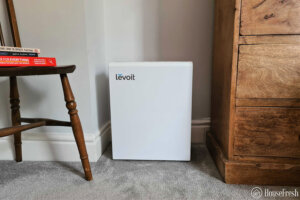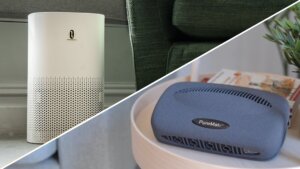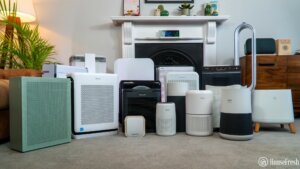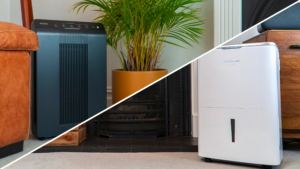Breathing in clean, healthy air is vital for well-being, and many people find that inhaling essential oils can help to reduce stress, improve mood and increase concentration. So what could be the harm in adding your favorite scent to your device? Well, you could do a lot of damage to the purifier.
But don’t worry because there is a specific cleaner that enables you to add essential oils, and we’ll discuss its pros and cons. We’ll also look at whether water-based purifiers are any good and at the difference between oil diffusers and air purifiers.
Finally, if you need advice on the best essential oils for your home, check out our guide at the end of this article.
Is it Ookay to put ssential oils in my air purifier?
The simple answer to this question is “yes, but…”
“Yes” because some air purifiers are specially designed to add essential oils.
And “but” because if you add essential oils to cleaners that don’t have this feature, you will do more harm than good. Now we’ve got that little warning out of the way, let’s look at why this is the case.
Firstly, most air purifiers contain parts intended to be kept dry. For example, their technology relies on a fan that pushes air through a filter. As essential oils are in liquid form, it could spell disaster if you get any of these components wet. This is particularly true for HEPA filters.
These filters are the gold standard for removing the maximum amount of harmful airborne particles. The Environment Protection Agency states they can “theoretically remove at least 99.97% of dust, pollen, mold, bacteria and any airborne particles with a size of 0.3 microns”.
Yet if the fibers within the filters get wet, they’ll become damaged and will no longer be able to capture those nasty particles. This is also why we strongly advise against washing your HEPA filters when they’ve become clogged and replacing them.
Not only will saturation impact their purification power, but washing may also mean you could release all that bad stuff back into your home. Hopefully, it’s clear by now that liquid plus HEPA filters do not mix!
The air purifier you CAN use with essential oils
Yes, there is a great air purifier that can also diffuse essential oils, and it’s called the Levoit Core Mini. But how exactly does it disperse those fragrant aromas around your room while keeping the rest of the system dry to remove toxins?
This super small and ultra-quiet unit contains a “fragrance sponge” or “aroma pad.” This sits at the top of the purifier and lets you add a few drops of your favorite scent and relax. The HEPA and activated charcoal filters then simultaneously get to work at purifying your space.
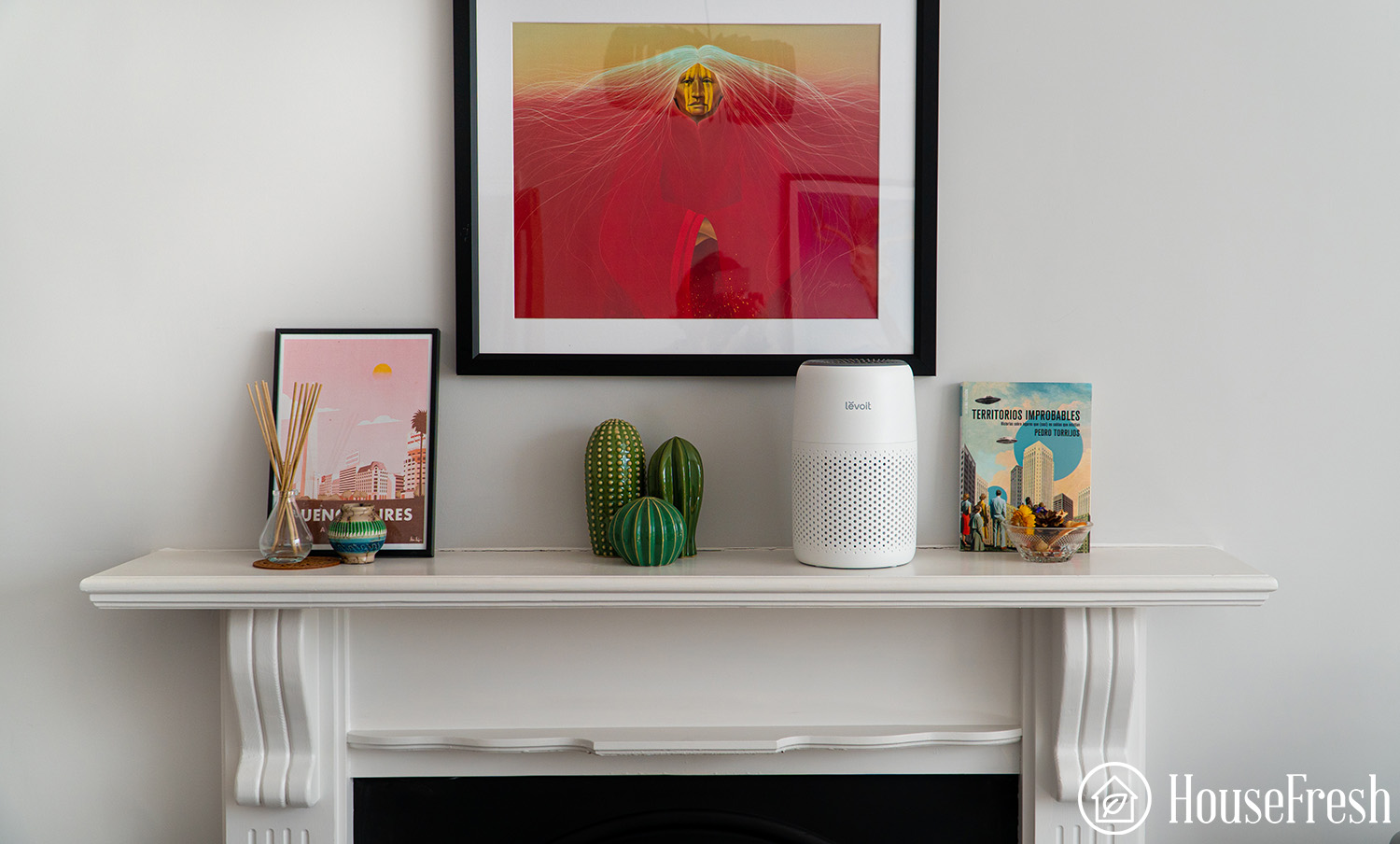
With a CADR of 35CFM, the Core Mini is less than $50 and has a low power draw, which means it should cost you less than $20 in electricity per year. The downsides are that it may not suit everyone’s needs, especially if you have extensive areas to purify and to replace the filters can be costly.
However, it’s still a great choice if you want a 2-in-1 system that cleans and aromatizes rooms up to 178 square feet. If you travel regularly, it’s small enough to take with you. Those long car rides can be made a bit more pleasant when you know that the air inside your vehicle is clean and that you’re inhaling a lovely, calming scent. For more info about the device, check out our detailed review.
Are water-based air purifiers any good?
Sometimes also referred to as air revitalizers or air washers, these systems utilize water to clean the air. The process is pretty simple; they pull dirty air into the device via intake vents. This air is swirled inside the water basin and fresher air is released back into the room.
As well as adding some lovely aromas to your home via essential oils, water-based purifiers can also act as humidifiers. This can be beneficial, especially in the winter, if you experience dry skin or suffer from congestion, as increased moisture may help you breathe more easily.
However, while water-based purifiers have some uses and can trap particles, most are dust particles. They’re simply not capable of capturing anywhere near as many harmful, microscopic particulates, such as mold spores, as a purifier with a HEPA filter.
If you’re looking for a purifier that will truly clean the air inside your home, you’re much better off investing in a standard cleaner rather than a water-based unit.
Essential oil diffusers vs. air purifiers – What is the difference?
While oil diffusers and air purifiers can positively impact our indoor environments, the differences between the two devices are significant.
Using HEPA filters, air purifiers are scientifically proven to capture indoor pollutants such as mold, pet dander and pollen. They can also help to reduce allergy and asthma symptoms. Including an activated charcoal filter can eliminate strong odors like cooking and tobacco smoke and trap volatile organic compounds (VOCs).
Oil diffusers, however, do not clean your air. Instead, they help to create a relaxing and calming atmosphere.
There are four types of oil diffusers:
- Nebulizing
- Ultrasonic,
- Heat
- Evaporative
Yet they all work similarly by releasing a scented mist that can help relieve stress and anxiety while easing health conditions like dry skin and sinus problems. But unlike air purifiers that eradicate odors, diffusers cover these up by adding new scents.
The good news is that you don’t have to choose one device over the other, as both can be used together.
| Air Purifier | Essential Oil Diffuser |
| Best option for cleaner, healthier air inside your home. | Improves your well-being with invigorating and revitalizing aromas. |
The best essential oils for air purification
Now that you know how to use essential oils with an air purifier let’s look at some of the best ones to choose from.
1. Lavender – Nicknamed the mightiest of all essential oils, the scent has been found to have stress-relieving and emotionally soothing properties. This study found that lavender inhalation can help to reduce anxiety levels.
Diffuse the oil into your bedroom before going to sleep, or just dab a few drops into your pillow for a good night’s sleep.
2. Tea Tree – Used as traditional medicine by the Aboriginal people of Australia for hundreds of years, tea tree oil is believed to have antibacterial and anti-inflammatory properties. Some studies have shown that evaporating the oil may help to reduce airborne mold in the home.
If you spot areas of mold, diffusing the oil nearby can help to tackle it. Or, if you want to use it as a cleaning agent, you can mix it with water and clean surfaces.
3. Jasmine – Often used in perfumes and desserts because of its sweet scent, jasmine may also have health benefits. One study found that inhalation can be particularly effective in improving mood and well-being.
Diffuse the oil in your living room or hallway for a relaxing and calming ambiance when you want to unwind. Alternatively, place it in your bedroom for a peaceful night’s sleep.
4. Peppermint – Crossed between water mint and spearmint, the herb peppermint has been used for thousands of years to help ease digestive conditions. The aroma of peppermint has also been found to improve memory and alertness.
To get you going in the morning and help keep your mind sharp, diffuse the oil in your kitchen or dining table.
5. Ylang Ylang – A star-shaped, yellow flower native to Southeast Asian countries such as the Philippines, the scent of ylang-ylang can help to relieve stress and boost mood. In one study, the self-esteem of participants also improved.
For self-care, you can diffuse the oil in your living room or a quiet place such as a reading nook, bedroom or study.
Final thoughts
Whether it’s the scent of lavender to help you relax or peppermint to boost your concentration, essential oils can have many benefits. Breathing in purified, filtered air is also crucial for your overall health. However, it’s essential to be cautious when combining the two methods.
Water-based cleaners may be able to improve some of the air quality inside your home as well as add a pleasing aroma. But for genuinely effective purification, your best bet is to use a device with a HEPA filter also designed for essential oils, such as the Levoit Core Mini.
SOURCES
- Ashton, D. (2022). HouseFresh. Levoit Core Mini Review. housefresh.com
- Air Purifier MD. (2020). Can I Use Essential Oils in an Air Purifier? airpurifiermd.com
- Booth, D. (2022). HouseFresh. Can HEPA Filters Be Washed And Reused? housefresh.com
- Donelli, D., et al. (2019). Science Direct. Effects of lavender on anxiety: A systematic review and meta-analysis. sciencedirect.com
- Environmental Protection Agency. (2022). What is a HEPA filter? epa.gov
- Environmental Protection Agency. (2022). Air Cleaners and Air Filters in the Home. epa.gov
- Green Orchard Group. (2021). 5 Air Purifying Essential Oils That Kill Mold. greenorchardgroup.com
- Gnatta, J.R., et al. (2014). National Library of Medicine. Aromatherapy with ylang ylang for anxiety and self-esteem: a pilot study. pubmed.ncbi.nlm.nih.gov
- Healthline. (2022). 14 Everyday Uses for Tea Tree Oil. healthline.com
- Mills, I. (2022). Fresh Air Devices. Do Water Air Purifiers Work? freshairdevices.com
- Moss, M., et al. (2008). National Library of Medicine. Modulation of cognitive performance and mood by aromas of peppermint and ylang-ylang. pubmed.ncbi.nlm.nih.gov
- Nall, R. (2019). Medical News Today. Which essential oils can relieve anxiety? medicalnewstoday.com
- National Center for Complementary and Integrative Health. (2020). Peppermint Oil. nccih.nih.gov
- Santos-Longhurst, A. (2018). Healthline. Everything You Need to Know About Jasmine Essential Oil. healthline.com
- Saju, N. (2019). Livspace. 6 Essential Oils to Purify the Air & Help You Unwind. livspace.com
- Sayowan, W., et al. (2013). Research Gate. The effects of jasmine Oil inhalation on brain wave activities and emotions. researchgate.net
- Silva, J. (2022). Air Purifier Essentials. Can I Use Essential Oils in My Air Purifier? airpurifieressentials.com
- Silvia, J. (2022). Air Purifier Essentials. What is a Water Based Air Purifier? | The Pros & Cons of Water Air Revitalizers. airpurifieressentials.com
- Su, H-J., et al. (2007). Science Direct. The effects of evaporating essential oils on indoor air quality. sciencedirect.com
- Whelan, C. (2020). Healthline. About Ylang Ylang Essential Oil. healthline.com


